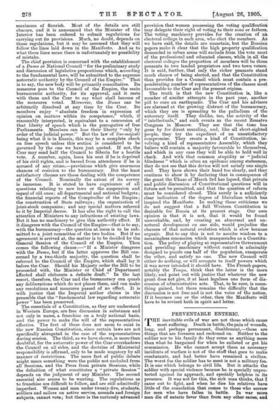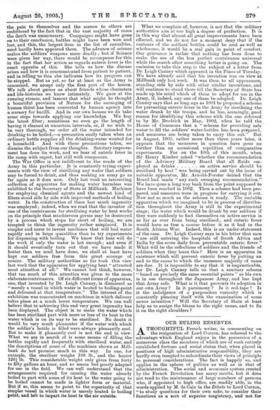the pain to themselves and the sorrow to others are
embittered by the fact that in the vast majority of cases the death was unnecessary. Campaigns might have gone on to their conclusion, battles might have been won and lost, and this, the largest item in the list of casualties, need hardly have appeared there. The advance of science makes the soldiers' weapons more deadly ; but if Science were given her way, there would be recompense for this in the fact that her action as regards enteric fever is the exact opposite of this. She tells us how the disease arises and how it is communicated from patient to patient, and in telling us this she indicates how its progress can be stopped. But as yet, so far at least as the Army is concerned, we accept only the first part of the lesson. We talk about germs as about friends whose characters and life-histories we know intimately. We gaze at the running stream, and lament that what might be thought a bountiful provision of Nature for the assuaging of human thirst has been converted by human agency into a nursery for bacilli. And in our own houses we do take some steps towards applying our knowledge. We buy the latest filter; sometimes we even go the length of having it cleaned at uncertain intervals, or, if we wish to be very thorough, we order all the water intended for drinking to be boiled,—a precaution easily taken when an ordinary kettle supplies all the drinking-water wanted for a household. And with these precautions taken, we dismiss the subject from our thoughts. Sanitary improve- ment has done its work, and we hear of enteric fever in the camp with regret, but still with composure. The War Office is not indifferent to the needs of the Army in this particular. It is constantly trying experi- ments with the view of sterilising any water that soldiers may be forced to drink, and thus making an army go as far again as it does now. Only last week an interesting collection of apparatus for making water harmless was exhibited to the Secretary of State at TViillbank. Machines for employing chemical agents and the newest kind of filters stood side by side with improved methods of boiling water. In the construction of these last much ingenuity was employed ; indeed, when we read that the inventor of one of the contrivances for sterilising water by heat works on the principle that mischievous germs may be destroyed by a process which stops far short of boiling, we are tempted to think the ingenuity rather misplaced. It is simpler and surer to invent machines that will boil water rapidly and. in large quantities than to try experiments for dispensing with boiling. We know that heat will do the work if only the water is hot enough ; and even if it should eventually turn out that we have made it hotter than we need have done, we shall at least have kept our soldiers free from this great scourge of armies. The military authorities so far took this view last week that the apparatus for applying beat "attracted most attention of all." We cannot but think-, however, that too much of this attention was given to the more elaborate contrivances. Of six different forms of apparatus, one, that invented by Dr. Leigh Canney, is dismissed as "merely a vessel in which water is heated to boiling-point and delivered at that temperature." The interest of the exhibition was concentrated on machines in which delivery takes place at a much lower temperature. We can well believe that in achieving this end very great ingenuity has been displayed. The object is to make the water which has been sterilised part with more or less of its heat to the water which is on its way to be sterilised. No doubt it would be very much pleasanter if the water with which the soldier's bottle is filled were always pleasantly cool. But to make it pleasantly cool is not the end in view. What we are in search of is some means of filling the bottles rapidly and frequently with sterilised water, and. the descriptions of some of the machines shown at Mill- bank do not promise much in this way. In one, for example, the steriliser weighs 198 lb., and the heater 126t lb. This considerable weight only gives from forty to fifty gallons an hour, and so seems but poorly adapted for use in the field. We can well understand that the arrangements required for causing the water already boiled to part with some of its heat to the water going to be boiled cannot be made in lighter form or material. But if so, this seems to point to the superiority of that simpler vessel in which water is merely heated to boiling point, and left to impart its heat to the air outside. What we complain of, however, is not that the military authorities aim at too high a degree of perfection. It is in this way that almost all great improvements have been effected, and we do not for a moment deny that if the contents of the soldiers' bottles could be cool as well as wholesome, it would be a real gain in point of comfort. Our grievance is rather that nothing has been done to make the use of the less perfect contrivance universal while the search after something better is going on. The omission to take this step is the subject of a letter from Dr. Leigh Canney which appeared in the Times of Tuesday. We have already said that his invention was on view at Milbank only last week. It was then, to all appearance, standing side by side with other similar inventions, and will continue to stand there till the Secretary of State has made up his mind which of them to adopt for use in the Army, if, indeed, any one of them be adopted. Dr. Leigh Canney says that as long ago as 1901 he proposed a scheme for preventing enteric fever in the Army by sterilising the water drunk by the troops, and he has, seemingly, good. reason for identifying this scheme with the one referred to by Mr. Brodrick in May, 1902, when he told the House of Commons that a "scheme for providing safe water to fill the soldiers' water-bottles has been prepared, and measures are being taken to carry this out." But in August, 1905, rather more than three years later, it appears that the measures in question have gone no further than an occasional repetition of comparative experiments. For on the 10th of this month, when Sir Henry Kimber asked "whether the recommendation of the Advisory Military Board that all fluids em- ployed as drinks on active service should be sterilised by heat" was being carried out by the issue of suitable apparatus, Mr. Arnold-Forster denied that the Board had made "any such sweeping recommendation." We have gone a long way back from the point supposed to have been reached in 1902. Then a scheme had been pre- pared, and measures were in progress for carrying it out. Now not so much as the scheme is ready. The suitable apparatus which we imagined to be in process of distribu- tion throughout the Army is still in the experimental stage; the water which would be drunk by our soldiers if they were suddenly to find themselves on active service is as far as ever from being sterilised; and enteric fever would have as free a course before it as it had in the South African War. Indeed, this is an under-statement of the case. Dr. Leigh Canney says in his letter that men "are still entering the hospitals of South Africa and India by the score daily from preventable enteric fever." What will be the reflections of soldiers and the friends of soldiers when they learn this ? Here is an apparatus in existence which will prevent enteric fever by putting an end to the cause to which the immense majority of cases are due. It is impossible to say that it is impracticable, for Dr. Leigh Canney tells us that a sanitary scheme "based on precisely the same essential points" as his own is in use throughout the Japanese Army, and has kept that Army safe. What is it that prevents its adoption in our own Army ? Is it parsimony ? Is it red-tape ? Is it the indulgence of a purposeless curiosity which is constantly pleasing itself with the examination of some newer invention ? Will the Secretary of State at least help us to assign the blame to the right cause, and to fix it on the right shoulders ?



































 Previous page
Previous page